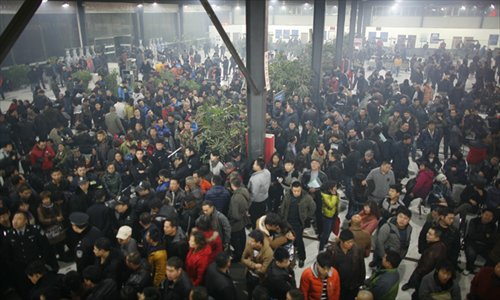HOME >> OP-ED
Failure to restrict traffic for smog frustrates
Source:Global Times Published: 2013-12-24 1:04:00

People flood to a local auto market in Tianjin on Sunday, a day before the city imposed a restriction on the purchase of vehicles. Photo: CFP
On Sunday evening, the Tianjin Environmental Protection Bureau (TEPB) issued a traffic restriction scheme based on car license plate numbers for Monday in response to heavy smog. The news was quickly circulated, with many Tianjin residents objecting to it. Hours later, the local traffic management bureau said that the city would not implement the scheme. Yesterday afternoon, traffic authorities announced again that the scheme will still be implemented, but any violators will not be punished.
Obviously, the TEPB and the traffic management bureau did not coordinate well, leading the government to become a laughing stock. There has been joyful sentiment on the Internet, as the Net users would most like to see the government make a fool of itself.
This isn't the first case of failure to restrict vehicles due to smog. This may make other cities hesitate when trying to adopt similar measures to deal with smog. Actually, those that didn't coordinate well are the government and residents whose attitudes toward restricting vehicles for smog differ greatly.
Public opinion stresses that it is the government's responsibility to bring the blue sky back and such a responsibility has nothing to do with ordinary people. Some well-known figures have publicly objected to traffic restrictions due to air pollution, believing it intrudes on people's personal rights.
China is no longer in an era when individuals are encouraged to cooperate with the government to solve public difficulties. Asking people to sacrifice their own interests is not welcomed.
Against such a background, the announcement by the TEPB seems too hasty. The bureau overestimated the determination of Tianjin residents who would not like to experience any ordeal just in exchange for breathing less smog.
Environment authorities have been criticized and the traffic authorities were also compromised. This highlights the hesitation of Tianjin society as to what to do about heavy smog. Actually, this is the dilemma China is facing. On the Internet, people mocked Tianjin's unwise moves, but its residents still have to suffer from the smog.
Environment authorities do not rank high among all public institutions. Neither the government nor the public seems to lend a supporting hand to environment protection. The TEPB was serious about curbing air pollution. Although the scheme failed, its attitude is to be admired.
Dealing with air pollution will transform China's development model and lifestyles. Such reforms will not guarantee that people can enjoy a comfortable life and development benefits at the same time.
The announcement of traffic restrictions will always come hastily.
Whether a city can reduce the number of cars on the roads depends on its management capabilities and on how determined the public is to cooperate with the government.
Posted in: Editorial